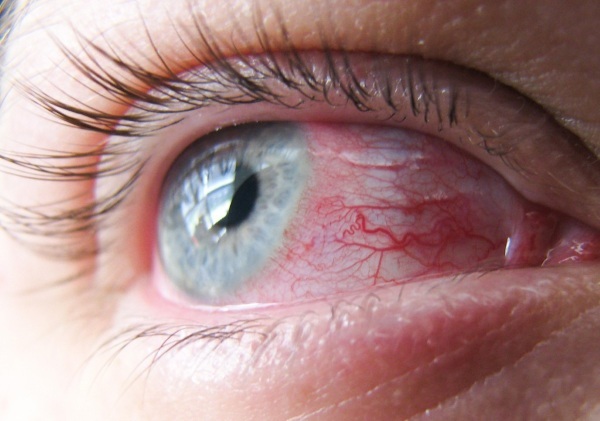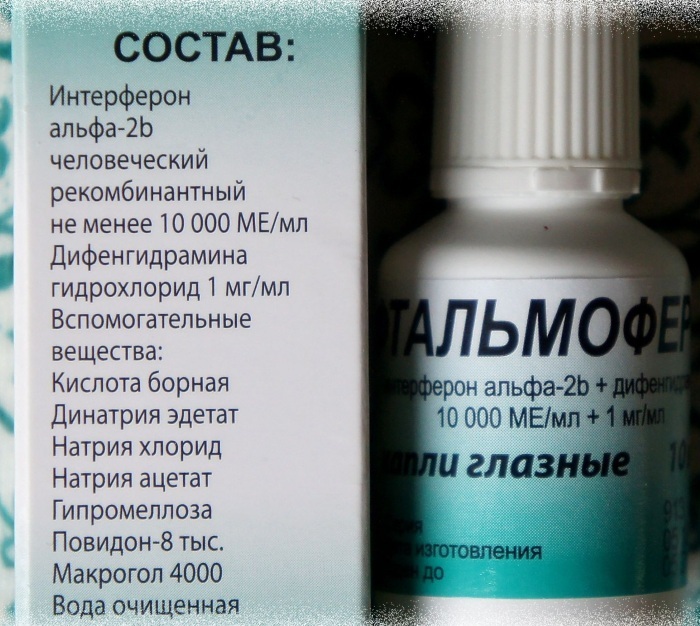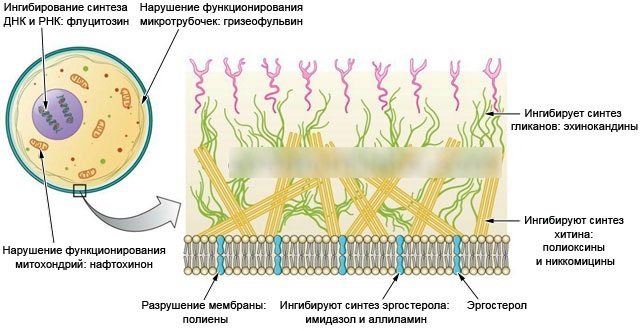Anti-inflammatory eye drops effect is prescribed to a person when his body reacts to an inflammatory process, which can be provoked by injury, infection or the development of pathology.
An eye problem can be indicated by redness around the eyes, signs of puffiness, itching, watery eyes, and pain.
The following pathologies can cause eye inflammation:
- conjunctivitis;
- blepharitis;
- dacryocystitis;
- keratitis;
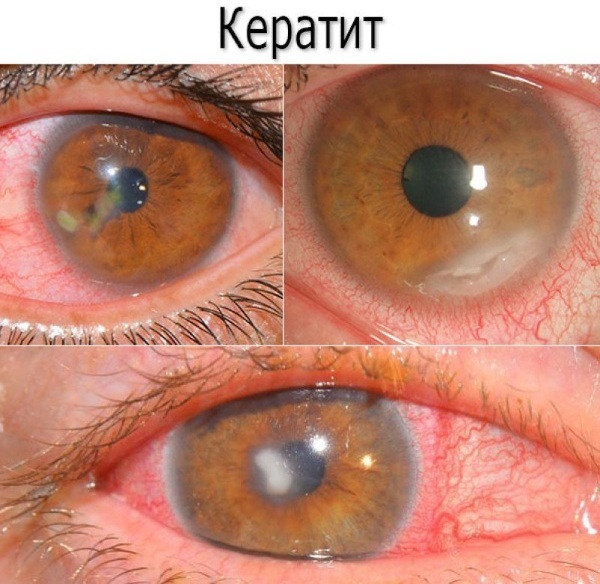
- scleritis;
- barley.
Anti-inflammatory eye drops are prescribed to the patient not only during the acute phase of the disease, but during the transition of the disease to the chronic form. The ophthalmologist should prescribe the drug after a comprehensive examination and finding out the reason.
Self-medication can worsen vision and provoke malfunctions in each of the body systems, because many drugs have contraindications and undesirable manifestations.
Record content:
- 1 Classification
-
2 Top 10 drugs from the pharmacy
- 2.1 Diclofenac
- 2.2 Diklo-F
- 2.3 Albucid
- 2.4 Uniflox
- 2.5 Indocollir
- 2.6 Nevanak
- 2.7 Dexamethasone
- 2.8 Maxitrol
- 2.9 Prenacid
- 2.10 Oculohel
- 3 Video about eye drops
Classification
To cure any eye pathology, a specialist selects drops that not only alleviate symptoms, but also normalize the organs of vision. All anti-inflammatory drugs are divided into three types. The table below shows all the groups and their features.
| Drug type | Peculiarities |
| NSAIDs (non-steroidal anti-inflammatory drugs) | This group includes drugs that block the inflammatory process provoked by non-infectious causes. The drops help relieve pain by directly targeting pain mediators. Also, such solutions stop platelet aggregation, reducing blood viscosity. |
| Anti-inflammation steroids | These are hormonal drugs that help to quickly cope with disease-causing organisms that cause infection. These medicines are considered the most powerful, they cope not only with inflammation, but also have anti-allergic and immunosuppressive properties. These medications are prescribed if non-steroidal drugs have not brought relief. |
| Combined | These solutions contain in their composition two active substances at once: an antibiotic and an anti-inflammatory agent, it is a glucocorticosteroid. The action of these components is aimed at relieving inflammation and other symptoms of the disease. But the solution should be used strictly, following the instructions. |
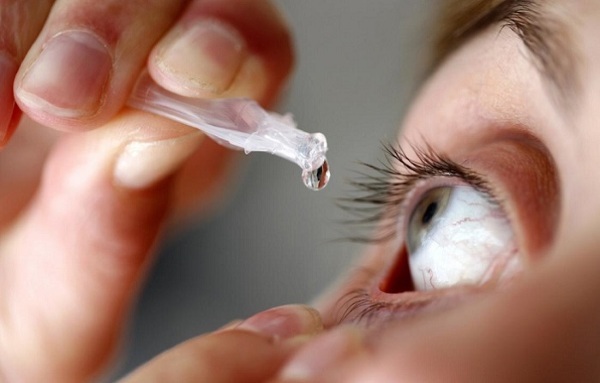
Also, all anti-inflammatory eye drops are of several types:
- Antibacterial. They help relieve inflammation that was triggered by the presence of a bacterial infection. These funds include Albucid.
- Antiviral. These solutions have an antiviral effect, are prescribed for conjunctivitis, keratitis. This group includes Oftalmoferon.
- Antiseptic. They are prescribed for bacterial, viral and fungal infections that cause inflammation. Vitabakt, Okomistin.
Anti-inflammatory eye drops, like any other medications, have contraindications and application features, therefore, before starting therapy, you should carefully read the instructions.
Top 10 drugs from the pharmacy
There is a wide variety of anti-inflammatory eye drops in pharmacies. Among them are inexpensive drugs that effectively deal with the symptoms of inflammation: redness, fatigue, itching, swelling. The ophthalmologist should select the solution.
Diclofenac
This is one of the inexpensive but effective drugs that belongs to the group of non-steroidal drugs. Inflammation of the mucous membrane of the eye causes discomfort, which will help to remove drops with the active ingredient - sodium diclofenac. This substance reduces the severity of edema, relieves pain and redness.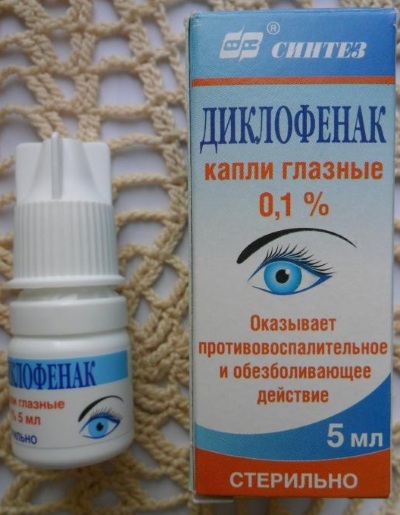
In addition to the active component, there are others:
- propylene glycol helps to retain moisture in the mucous membrane of the eye, preventing drying out;
- boric acid has antiseptic and antimicrobial properties;
- sodium thiosulfate is an antibiotic that has a detrimental effect on pathogens.
Diclofenac solution is prescribed for such ailments:
- inflammation caused by infection and other causes;
- prevention after injury and surgery;
- tearing;
- conjunctivitis;
- burns and corneal erosion.
Drops should be instilled into the eye directly into the conjunctival sac, pulling it slightly.
The dose depends on the reason for the administration of the drug:
- during the operation, 1 drop 5 times in intervals of 40 minutes;
- after surgery, 1 drop up to 5 times a day;
- with inflammation provoked by a corneal injury, up to 5 times a day for a week;
- with photosensitivity and inflammation, drip in the morning and evening for 14 days.
Diclofenac therapy is not recommended for more than 4 weeks.
You can not use the drug in such cases:
- intolerance to the components that make up the composition;
- asthma;
- pathologies that have affected the digestive system (ulcer, gastritis and others);
- hemophilia;
- bleeding;
- carrying a baby and breastfeeding;
- children under 2 years old.
In rare cases, after applying the solution, undesirable manifestations may be observed:
- allergy;
- clouding of the cornea;
- swelling of the face;
- corneal ulcer.
The drug is used with caution in the treatment of children under 12 years of age. Drops are produced in a bottle with a dropper cap, a volume of 5 ml, the price is from 40 rubles.
Diklo-F
This drug, which has a local anti-inflammatory effect, contains the active ingredient - sodium diclofenac.
Additionally, other substances have been added to the composition to improve penetration active substance inside the mucosa for greater efficiency:
- disodium edetate;
- benzalkonium chloride;
- polyoxyl 35;
- boric acid;
- Castor oil;
- tromethamine;
- distilled water.
Due to the balanced composition, Diclo-F drops have decongestant, anti-inflammatory and analgesic properties. The drops suppress the production of prostaglandins, thereby reducing inflammation.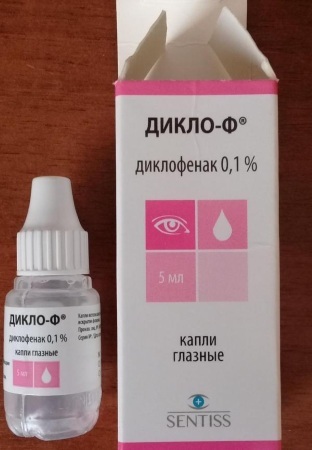
The standard dose is 1 drop up to 4 times a day with equal intervals between instillations. The course is not more than 14 days.
You can not use drops for such ailments:
- intolerance to the components that make up the composition;
- disturbances in the work of the hematopoietic system;
- erosion and ulcers that have affected the digestive system;
- asthma.
With extreme caution, use the solution for instillation in the eyes should be the elderly, children, pregnant and lactating mothers.
If the dosage is not observed, undesirable manifestations may occur, such as a local allergic reaction, facial edema, vomiting, and nausea. A bottle with a dropper cap, 5 ml, costs from 140 rubles.
Albucid
Anti-inflammatory drops for eyes Albucid have bacteriostatic and antiseptic properties. Effectively fight against bacterial microflora that provokes the development of inflammation. The main component of the solution is sulfacetamide, which effectively fights infection and inflammation. Additional components - hydrochloric acid, sodium thiosulfate.
The medicine is produced in the form of a solution with 20 and 30% concentration of the active ingredient.
Albucid is a narrow spectrum antibiotic that can effectively fight bacteria susceptible to sulfacetammide.
The drug is prescribed for the treatment of various ailments of the eyes: conjunctivitis, keratitis, blepharitis, gonorrheal infection of the organs of vision, blenorrhea.
In severe pathologies, it is recommended to instill a solution of 2-3 drops up to 6 times a day in both eyes. Do not use the medicine more often than 4 hours later. The average course of treatment is 7 days.
Do not prescribe the drug in case of intolerance to the components of the composition. Do not use the drug for drivers setting off on the road, as a decrease in visual acuity is possible.
A bottle of solution, with a volume of 5 ml, will cost an average of 50 rubles.
Uniflox
Uniflox eye drops have an anti-inflammatory effect, relieve pain, remove discomfort. Its main component is ofloxacin, which effectively kills bacteria, including intracellular ones.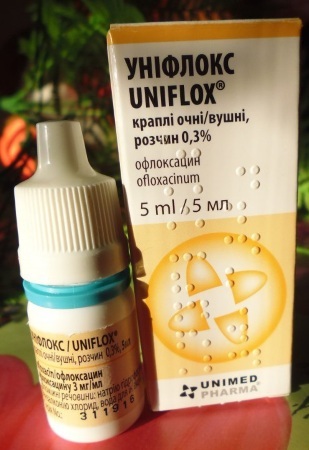
Prescribe a medication in the form of a solution for ailments of an infectious and inflammatory nature. Also, the drug is effective in the treatment of diseases of the respiratory system, bones, joints, nose.
The dose is selected individually, depending on the severity of the disease. On average, it is allowed to use up to 800 mg of the drug per day, divided into 2 instillations. The course is selected by an ophthalmologist.
Do not prescribe the drug to women during breastfeeding and carrying a baby, as well as to children under 18 years of age.
Violation of the dose and course of treatment leads to irreversible consequences - the manifestation of side effects. They can manifest as nausea, vomiting, dizziness, insomnia, edema, and frequent urination.
Drops in a bottle with a dropper in a volume of 5 ml can be purchased for 120 rubles.
Indocollir
It is a broad-spectrum drug that effectively relieves pain and relieves inflammation.
The active ingredient is indomethacin, which inhibits the synthesis of prostaglandins, which perform a function in the pathogenesis of pain and inflammation. In order for the medicine to be absorbed faster and in full into the mucous membrane of the eye, other components were added to its composition: arginine, thiomermal, hydrochloric acid, water.
A drug is prescribed to relieve pain and inflammation.
The dosage and treatment regimen is selected individually for each patient, depending on the complexity of the course of the disease.
It is not recommended to use the drug for therapeutic purposes for people with intolerance to the components, included in the composition, with asthma, ulcers and erosion of the stomach, dysfunctions of the hematopoietic system, kidneys and liver. Pregnant, lactating mothers and children under 14 years of age are also not prescribed the drug.
Among the undesirable manifestations, a local allergic reaction is more often manifested, visual acuity decreases.
A solution in a glass bottle with a dropper cap of 5 ml costs from 390 rubles.
Nevanak
This medication effectively fights any pathogens of inflammation, relieves pain and swelling. The main component is nepafenac, and in order to improve its activity, additional components were added: tyloxapol, sodium chloride, carbomer, hydrochloric acid.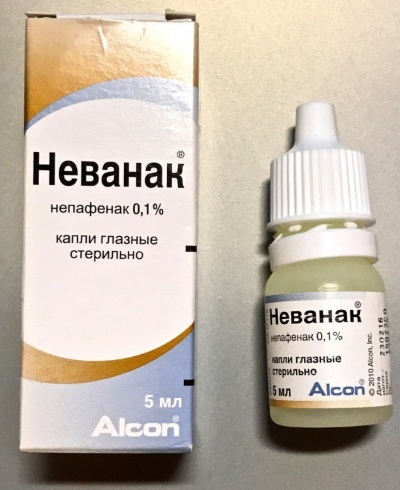
The drug is prescribed for increasing pain and inflammation.
The standard therapy regimen is 1 drop 3 times a day for 14 days.
You can not use a medication for such problems:
- intolerance to any of the components of the composition;
- pregnancy and lactation;
- children under 18;
- asthma.
After some studies, it was found that if the dosage is not observed, the following reactions can be observed: itching, pain, inflammation of the cornea, accumulation of fluid in the tissues of the eye.
A Nevanak solution in a glass bottle with a dropper cap will cost an average of 550 rubles.
Dexamethasone
It is a synthetic glucocorticoid that is actively used in ophthalmology to treat infections and eye inflammation. The drug with the active ingredient of the same name is prescribed for the treatment of infections, diseases of the previous trauma and elimination of the inflammatory process.
Additional components help the main substance to quickly penetrate into the mucous membrane in full. Sodium tetraborate decahydrate, disodium edetate dihydrate, benzalkonium chloride were added to the composition.
The treatment regimen is selected depending on the severity of the disease. The standard dosage is 1 drop 3 times a day in each eye. The duration of therapy should not exceed 10 days.
You can not use the solution to treat inflammation if: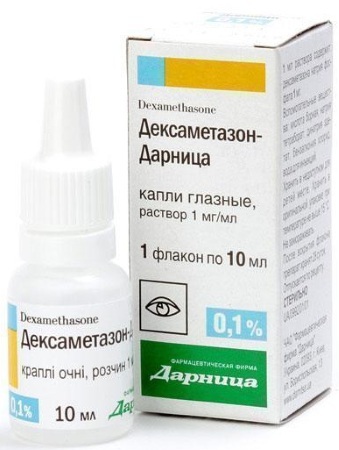
- inflammation caused by a virus;
- there is a purulent infection;
- diagnosed with smallpox;
- there is an individual intolerance to the composition;
- the child is not yet 3 years old.
Violation of the prescribed dose can cause undesirable manifestations:
- burning, itching;
- tearing;
- swelling of the eyelids;
- increased intraocular pressure;
- perforation of the cornea;
- visual impairment.
A 10 ml bottle with a dropper will cost 50 rubles.
Maxitrol
This solution for instillation in the eyes has a pronounced antibacterial and anti-inflammatory effect.
Its effectiveness is due to the correctly selected composition:
- active substance - dexamethasone relieves inflammation, prevents the development of allergies and exudate;
- polymyxin fights against pathogens;
- additional components: sodium chloride, benzalkonium chloride solution, help the main component to better penetrate deep into the mucous membrane.
The solution is prescribed for the treatment of infections caused by the presence of pathogens, stopping the inflammatory process.
- The course and dose are selected individually, depending on the severity and stage of the disease.
- Do not prescribe the solution to pregnant women, during lactation and children.
- Among the side effects, a local allergic reaction is most often observed.
- Maxitrol is sold only by prescription, the price varies from 400 rubles.
Prenacid
This drug belongs to the group of topical glucocorticosteroids. The solution is widely used in ophthalmology to treat inflammation and allergies of the organs of vision. The active ingredient, sodium desonide phosphate, has a pronounced prolonging effect without systemic action.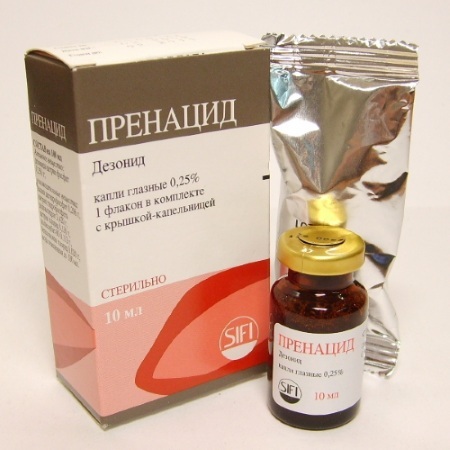
This substance reduces the permeability of the walls of blood vessels, stops the motor reaction of microbes. The medication in the form of a solution stops the activity of inflammatory mediators and enzymes that destroy tissues, having anti-inflammatory, antiallergic and vasoconstrictor properties.
The drug is prescribed for therapeutic purposes for:
- inflammation of the posterior and anterior segment of the eye;
- Do not lie.
Assign drops to instill in each eye 1-2 drops up to 4 times a day. The duration of therapy is selected depending on the severity of the disease.
You can not prescribe the drug in such cases:
- damage to the organs of vision by mycobacterium;
- viral pathologies;
- damage to the cornea with herpes;
- purulent inflammation;
- smallpox infections;
- children under 18;
- pregnancy;
- violation of the integrity of the corneal epithelium.
If the dosage is not followed, reactions such as allergies, discomfort, burning, itching, and ulceration may occur.
A bottle of 5 ml will cost 250 rubles on average.
Oculohel
This is a herbal homeopathic remedy that effectively treats inflammation, has an analgesic effect, and removes allergy symptoms. The composition includes extracts of medicinal plants: echinacea, spoon, eyebright and pilocarpus jaborandi.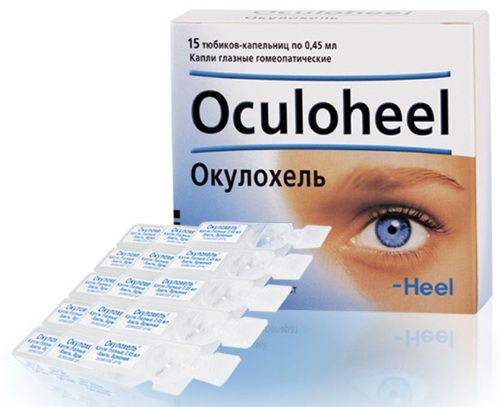
Drops are prescribed for:
- tearing;
- conjunctivitis;
- photophobia;
- eye fatigue;
- irritation and inflammation of the mucous membrane.
It is recommended to instill the drug in each of the eyes 1-2 drops up to 4 times a day for 2 weeks. The drug is not recommended during lactation, gestation, children under 18 years of age and sensitivity to the components of the composition. Among the side effects, a local allergic reaction is most often observed. The price for a bottle with a dropper cap is from 500 rubles.
Drops for the eyes, which have an anti-inflammatory effect, must be prescribed by an ophthalmologist. The specialist will conduct an examination, identify the cause of the ailment, take into account the characteristics of the patient's body and select the most effective of the drugs that will help to stop the inflammatory process in a short time without unwanted manifestations.
Video about eye drops
Ophthalmologist on drops and eye lotions:

